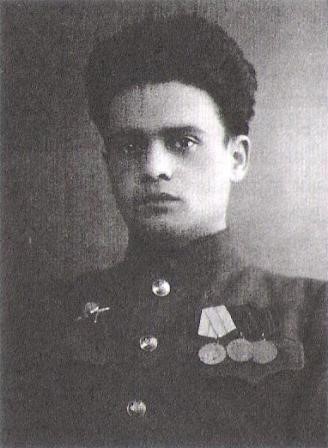Filipp Goldberg was born in 1925 in Leningrad (present-day St. Petersburg, Russia). In June 1941, he finished the 8th class of his school, and was looking forward to his summer vacation. He planned to travel to the region between Brest (Brześć nad Bugiem) and Białystok, where his maternal uncle Iosif Goldberg, a military doctor of the 3rd rank, was serving. However, the outbreak of the Soviet-German War on June 22 disrupted Filipp's plans. The uncle was taken prisoner by the Germans on one of the first days of the war, and killed; his family later perished in the Minsk Ghetto.
Filipp, together with his schoolmates, was sent to dig trenches and build fortifications. After that, he returned to Leningrad and worked at a military factory, producing 152mm (6 inch) shells for naval artillery. Leningrad was under siege, and starvation reigned in the city. As Filipp would later recall, in the winter of 1941-42 he was too weak to lift a shell. In February 1942, his father, Isaak Okun, starved to death. In spring 1942, Filipp was evacuated from Leningrad, traveling eastward across Lake Ladoga. After a lengthy stay in hospital, the 17-year-old Filipp was drafted into the Red Army in December 1942. He was sent to an officers' course, which trained mortar gunners. However, in summer 1943, the course was suddenly disbanded, and the cadets were sent to the Kursk Salient as privates. Sergeant Goldberg served as the gunner of a 76mm cannon. Then, along with his 129th Rifle Division, he took part in the Red Army offensive to recapture Briansk and Gomel (a Russian-Belorussian border region). Here, he was seriously wounded in November 1943. Once again, a long period of hospitalization ensued, after which he was sent to another officers' course. When he had completed that course, Colonel Sudakov, the commander of a school for riflemen and snipers, wished to retain Filipp as an instructor at the school; however, Filipp refused. As he would later explain,
"I could not stop thinking of my relatives, who had remained in German-occupied territory. And besides, I was disgusted by the dirty hints that 'all of them' [i.e. the Jews] were sitting out the war in Tashkent [Central Asia]".
Filipp was afraid that the irate Sudakov would withhold his officer's rank, and that he, Filipp, would once again be sent to the front as a private. However, Filipp Goldberg was promoted to second lieutenant, and the colonel gave him a warm handshake and wished him good luck.
Filipp arrived in Silesia in early 1945. He took part in the siege of Breslau, first as the commander of a platoon, and later as the commander of a company. In late April 1945, he was transferred to Berlin, where he witnessed the end of the war. He returned to the Soviet Union via Białystok, where he learned about the fate of his relatives.
Filipp Goldberg was awarded the Order of the Red Star and several medals.







